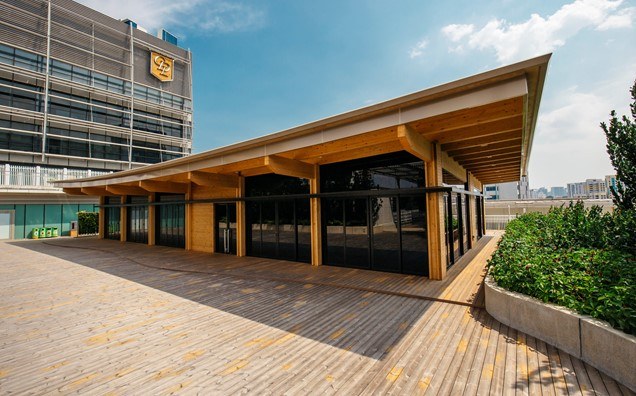Singapore, 9 March 2020 – For its robust and multipronged climate and water strategies and disclosures, CDL is the only company in Southeast Asia and Hong Kong to be recognised on both the 2019 CDP A List for corporate climate action and 2019 CDP A List for water security.
This is the second consecutive year CDL has received an A score for climate change strategy, and the first year that the company has received an A score for water security based on its inaugural participation in the CDP disclosure for water security.
With buildings contributing to some 40% of energy-related carbon emissions globally, the built industry has a huge potential to reduce carbon emissions. For Singapore, being projected to be one of the world’s most water-stressed countries by 2040 by the Water Resources Institute in 2015, the urgency in tackling the country’s water scarcity has long been a priority. In the face of the global climate emergency and resource depletion, CDL’s longstanding climate and water management strategies stand to help future-proof its business for a new climate economy.
CDP is widely recognised as the gold standard of corporate environmental transparency, using a detailed and independent methodology to assess organisations. It allocates a score of A to D- based on the comprehensiveness of disclosure, awareness and management of environmental risks and demonstration of best practices associated with environmental leadership, such as setting ambitious and meaningful targets. While more than 8,400 companies disclosed environmental data through CDP in 2019 for independent assessment against its scoring methodology, only 181 companies and 72 companies have made the A grade for their action on climate change and water security respectively.
“CDL is honoured to be recognised by CDP with two regional awards: ‘CDP 2019 A List: Climate Change’ for two consecutive years and ‘CDP 2019 A List: Water Security’ for the first time. 2019 ended the decade with record heat, devastating bushfires and high-impact weather that have continued to plague our environment. In this new decade, there is an urgency for businesses to actively reduce their carbon footprint and accelerate climate action. As a significant contributor to carbon emissions, the building sector must play a bigger role in driving emissions reduction. Being on the ‘A List: Water Security’ reaffirms our commitment to conserving precious water resources in Singapore, which was ranked first among various countries as having the highest risk of water-stress by 2040 according to the World Resources Institute. CDL will continue to steer affirmative climate action to support the global agenda towards a low-carbon and sustainable future by 2030.”
– Mr Sherman Kwek, CDL Group Chief Executive Officer
As part of its carbon management strategies, CDL has implemented a science-based approach to setting reduction targets for carbon emissions intensity. In 2018, CDL was the first Singapore property company to have its carbon reduction targets validated by the Science Based Targets initiative (SBTi). CDL has raised its carbon emission intensity reduction target to 59%, from the previous 38%, across its Singapore operations by 2030 from base-year 20071. For its development projects, CDL has committed to using sustainable building materials, instead of their conventional equivalents, to reduce embodied carbon2 by 24% by 2030.
In 2015, CDL established targets to reduce water use intensity by 15% against 2007 levels by 2030; and in 2017, as part of its ambitious targets in the CDL Future Value 2030 sustainability blueprint, CDL voluntarily raised its reduction targets to 38% against 2007 levels by 2030. As part of its strategic approach in water management, CDL also annually performs an impact analysis on its utility bills to better understand the implications of higher water tariffs.
Mr Paul Simpson, CDP Chief Executive Officer, said: “Congratulations to the companies that achieved a position on CDP’s A List this year, for leading in environmental performance and transparency. The scale of the business risks from the climate emergency, deforestation and water insecurity are vast – as are the opportunities from addressing them – and it’s clear the private sector has a vital role to play at this critical time. The A List companies are leading the market in corporate sustainability, tackling environmental risks and setting themselves up to thrive in tomorrow’s economy.”
CDL’s track record in effective ESG integration and strong performance has been widely recognised by leading global sustainability benchmarks. Earlier this year, CDL emerged as the world’s top real estate company in the 2020 Global 100 Most Sustainable Corporations in the World, ranking in at 36th position. This also makes CDL the top Singapore company and the longest-listed Singapore company on the index for 11 consecutive years since 2010.
In addition to the CDP accolades, CDL is also listed on 11 other leading sustainability benchmarks, rankings and indices such as the FTSE4Good Index Series (since 2002), the MSCI ESG Leaders Indexes (since 2010) and the Dow Jones Sustainability Indices (since 2011).
More information on CDL’s sustainability efforts can be found at www.cdlsustainability.com.
1 CDL will reduce Scope 1 and 2 GHG emissions per square metre of its Singapore operations. Scope 1 includes direct emissions that occur from sources that are owned or controlled by the company. For example, emissions from combustion in owned or controlled boilers, furnaces, vehicles, etc. and emissions from chemical production in owned or controlled process equipment. Scope 2 includes indirect emissions due to purchased electricity consumed at CDL’s Corporate Office, and managed buildings.
2 Embodied carbon of construction materials includes the GHG emissions arising from the manufacture, transport, assembly, replacement and deconstruction of building materials.


